- Home
- Karen Marie Moning
The Highlander's Touch Page 9
The Highlander's Touch Read online
Page 9
Circenn did not want to know what they’d been doing with the honey, and his expression must have clearly said as much, for Duncan burst into laughter.
“Excuse us, Cin.” He grinned as he dropped Alesone’s skirts with one hand, swung her up into his arms, and swept her from the kitchen.
Images of one-person-in-particular’s bare, rounded bottom assaulted him.
Circenn kicked out a chair, dropped his head on the table, and reconsidered killing the lass just to put himself out of his misery.
RUBY TOOK THE STAIRS TO THE STONES’ APARTMENT two at a time, but slowed her stride when she reached the third floor and proceeded down the dimly lit corridor. A colorful welcome mat—one of Lisa’s determinedly optimistic touches—brightened the appearance of the dismal door with its chips of peeling brown paint curling up from the underlying gray metal. APT. 3-G dangled at a lopsided slant from a single screw. Ruby raised her hand to knock but found herself straightening the sign instead, then dropped her fist to her side. She was dreading this visit. Twining a strand of hair around a nervous finger, she reminded herself that Lisa always faced things head-on; the least she could do was emulate her. When she raised her hand again, she knocked firmly. Elizabeth, the day nurse, opened it and ushered her in.
“Lisa? Is that you, darling?” Catherine called, a note of hope in her voice.
“No, Mrs. Stone. It’s just me, Ruby,” she replied as she crossed the small living room and turned down the narrow hallway to the bedroom. Entering the cozy room, she sank into a chair next to Catherine’s bed and wondered where to begin. She plucked idly at the half-finished patchwork quilt resting on the arm of the chair. How was she going to break the latest news to Lisa’s mom? Catherine was critically ill, her daughter had disappeared, and now Ruby had even worse news for her.
“What did the man at the museum say?” Catherine asked anxiously.
Ruby smoothed her hair and shifted in her seat. “Would you like some tea, honey?” she evaded.
Catherine’s green eyes, uptilted and once as bright as her daughter’s, met Ruby’s with a cool reminder that she wasn’t dead yet and wasn’t stupid either. “What did you find out, Ruby? Don’t try to distract me with tea. Has anyone seen my daughter?”
Ruby gently rubbed her eyes with her fingertips, careful not to smear her mascara. She’d been up most of the night and wondered for the tenth time how Lisa had managed to survive working two jobs for so long. She had been closing at the club when she received an urgent message from Mrs. Stone saying that Lisa had been missing since the night before last. She had immediately phoned the police, then gone to the museum to see if Lisa had arrived at work last night—which she hadn’t—then gone directly to the police station after speaking with that horse’s ass Steinmann.
The officer had dutifully filed a missing person’s report, which had been amended in a matter of hours by a warrant for Lisa Stone’s arrest.
“No one has seen her since night before last,” Ruby informed Catherine. “The museum’s security cameras have her on tape. The last recorded image of her is outside Steinmann’s office.”
“So at least we know that she made it to work the night you saw her at the bus stop,” Catherine said. “Do the cameras show her leaving that night?”
“No. That’s what’s so strange. Her slicker is still hanging by the door, and none of the cameras register her leaving. There are no cameras in Steinnman’s office, but he was quick to point out that there’s a window she might have used.” And quicker to make heinous accusations that Ruby knew weren’t true. But how was she to prove it, and where on earth was Lisa? She didn’t mention to Catherine that she’d gone to the police a second time, then had called every hospital within a sixty-mile radius, praying there were no Jane Does; blessedly, there hadn’t been.
“Isn’t Steinmann’s office on the third floor?” Catherine asked, perplexed.
“Yes. But he promptly pointed out that Lisa took rappelling when she was younger. I guess she listed that on her application as one of her hobbies. I know she was pretty proud of that skill.” Ruby shifted in her chair and took a deep breath. “Mrs. Stone, there’s an artifact missing from the museum, and …”
“They’ve accused my daughter of stealing,” Catherine said tightly. “Is that what you’re telling me?”
“Her … er … disappearance does make things look bad. According to Steinmann and his trusty tapes, he and a colleague entered his office several hours after Lisa had. The door wasn’t locked and initially he thought she’d simply failed to lock up. Now he thinks she was hiding in the office, took the artifact after they left, and slipped out the window.”
“What is this artifact?”
“They won’t say. It seems they aren’t completely certain what it was.”
“My daughter is not a thief,” Catherine said stiffly. “I will go speak with them.”
“Catherine, let me handle this for you. You can’t get up—”
“I have a wheelchair!” She gripped the sides of her hospital bed with thin hands and tried to push herself up.
“Catherine, honey,” Ruby said, her heart breaking. “We’ll find her. I promise. And we’ll clear her name.” She placed her hand over Catherine’s, gently loosening her grip on the rails. “We both know Lisa would never do something like this. We’ll find a way to prove it.”
“My daughter would never steal and she certainly wouldn’t leave me!” Catherine snapped. “She should leave me, but she wouldn’t.” The sudden burst of anger drained her, and she lay still for a moment. She drew a shuddering breath, then said faintly, “Steinnman pressed charges, didn’t he? There’s a … warrant … out for her, isn’t there?”
Ruby flinched. “Yes.”
Catherine inclined her head stiffly, then sank back against the pillows and closed her eyes. She was silent for so long that Ruby wondered if she’d fallen asleep. When she spoke again there was steel in her voice: “My daughter did not steal anything, and she’s in great trouble. Lisa is too responsible not to come home unless something awful happened to her.” Catherine opened her eyes. “Ruby, I hate to ask anything more of you, but for Lisa …”
Ruby didn’t hesitate. “There’s no need for apologies, honey, you know I love Lisa like a sister. Until she comes home—and she will be found and cleared—I’ll be spending most of my time here. She may call or try to get a message to you, and someone who can move at the drop of a hat needs to be here in case she does.”
“But you have your own life …” Catherine said gently.
Ruby’s eyes filled with tears. Catherine’s health had deteriorated rapidly since she’d last seen her, the night they had gone out to celebrate Lisa’s birthday. She clasped Catherine’s hand in hers and said firmly, “We’re going to find her, Catherine, and I’m hanging around until we do. I won’t hear any arguments about it. We’ll find her.”
If she’s still alive, Ruby thought, with a silent prayer.
DUNCAN WHISTLED A LIVELY TUNE AS HE MADE HIS WAY to Circenn’s chambers. Things had become quite interesting since the lass from the future had arrived. Circenn had willfully broken an oath and lied, and that, in Duncan’s mind, was nearly cause for celebration. Even Galan had conceded over breakfast this morning that it was something of a breakthrough. Although Galan had pushed Circenn to fulfill his vow last night, this morning he’d admitted to Duncan that he hadn’t seen Circenn Brodie quite so off balance in years. Nor had he seen such a look of fascination on his face as he’d glimpsed when he’d burst into Circenn’s chambers last night. Galan had agreed with Duncan that the lass might be the best thing that could have happened to Circenn, shaking up his rigid rules, forcing him to question himself.
Eighteen generations of Douglases had served the immortal laird of Brodie, and in the past few generations there had been much talk and deep concern about his increasing withdrawal. The Douglases were worried about him. In the not-so-distant past, the laird of Brodie had presided over the courts of his eleven manors.
But he hadn’t done so in over a century, leaving it to the various knights he’d appointed in his place to settle his people’s disputes. It used to be that the laird of Brodie had actively ridden out to his villages, talked with and been well acquainted with his people. Now Duncan wasn’t sure Circenn could identify one of his own villagers if he stood before him.
For the past hundred years, Circenn had spent most of his time traveling from country to country, fighting other people’s wars, and never being touched by any of it. He had only returned to Scotland to join the fight for his motherland when Robert the Bruce had been crowned king by Isabel, Countess of Buchan, at Scone.
Duncan’s Uncle Tomas argued that the laird of Brodie needed to wed, that it would draw him back into the joys of life. But Circenn refused to wed again, and they could hardly force him. Duncan’s father had settled for trying to get him to be intimate with a woman, but it seemed that Circenn Brodie had taken another of his absurd oaths and sworn off intimacy.
Circenn’s origins were lost in the mists of time, and the few times Duncan had questioned him about how he’d come to be immortal, the laird had grown taciturn, refusing to discuss it. But while sharing excessive quantities of whisky with Circenn one night, Duncan had come to understand a bit of why Circenn had decided not to become involved with another woman. Two hundred and twenty-eight years ago, Circenn’s second wife had died at the age of forty-eight, and Circenn had admitted, in a whisky-induced confidence, that he simply refused to watch another wife die.
“So, just tup every now and then,” Duncan had offered.
Circenn had sighed. “I cannot. I cannot seem to keep my heart from following where my body goes. If I am interested enough in a woman to take her to my bed, I want more of her. I want her out of my bed, too.”
Duncan had been shaken by that comment. “So spend time with her until it wears off,” he’d said easily.
Circenn had shot him a dark look. “Have you never met a woman with whom it did not wear off? A woman with whom you went to sleep at night, with the scent of her in your nostrils, and woke up in the morning wanting her as badly as you wanted to breathe?”
“Nay,” Duncan had assured him. “Lasses are merely lasses. You attribute too much significance to it. It is simply tupping.”
But it was not simply tupping to the laird of Brodie, and Duncan knew that. Lately, “simply tupping” wasn’t scratching Duncan’s endless itch, either. He wondered if it might be related to aging—that as a man grew older, indiscriminate intimacy began to chafe rather than to soothe.
Recently, Duncan had surprised himself by lingering with a wench past the duration of their physical intimacy, prolonging the afterglow, even asking questions besides “When is your husband expected back?”
Damned unnerving was what that was.
He shrugged, pushing the thought from his mind with a more pleasurable musing about Circenn. He had bet Galan his best horse that Circenn couldn’t bring himself to kill the woman from the future, and it was a bet he planned to collect on. The laird of Brodie needed to come back to life, and perhaps the unusual lass was the one to help him do it.
* * *
Lisa sat in the window of her room in Circenn’s chambers, gazing out at the afternoon. Behind a thick bank of clouds, the sun had passed midpoint and begun its slow descent toward the ocean. She instinctively glanced at her wrist to see what time it was and realized she didn’t have her watch on. She tried to recall if she’d had it on at the museum but wasn’t certain. She often took it off and put it in her coat pocket when she cleaned, so it wouldn’t get wet or dirty. She imagined she must have done so two nights ago and, caught up in her current mess, simply hadn’t thought about it since then.
She inhaled deeply, enjoying the crisp, salt air. I’m at Dunnottar, she thought, her amazement in no way diminished by twenty-four consecutive hours in the keep. She’d seen pictures of it, and one in particular had been etched into her memory, a black-and-white shot in which the enormous bluff towered up from the misty sea. It had looked a gothic, romantic place, and more than once Lisa had dreamed of someday going to Scotland to see it. She knew from the photo that the bluff was surrounded by ocean on three sides, connected to the mainland by a land bridge that she surmised was behind the keep. She knew also that Dunnottar had been taken by the English repeatedly, then reclaimed by the Scots, and that the Bruce had developed the habit of burning down every Scottish castle he reclaimed to prevent the English from taking it again.
Lisa had studied this period of history, snatching time to read on the shuttle bus, and had mourned the loss of so many glorious castles, but she conceded that the Bruce had been smart to do what he’d done. The Scots had built cleverly defensible castles; when the English took them, their men became nearly invincible. By destroying the stone keeps, the Bruce forced the battles led by Edward II to build their own fortresses, which were not nearly as defensible. While the English wasted an immense amount of time and resources building their own strongholds in Scotland, the Bruce gained time to replenish his forces and rouse the country.
This is 1314 Scotland! Lisa marveled. There would be a decisive battle at Bannockburn only a few months away, in which the Bruce resoundingly defeated England, finally turning the war in Scotland’s favor.
A sharp knock on the door interrupted her thoughts. Rising quickly, she tripped over the hem of her gown. At least this one fit her, she thought, but it certainly was uncomfortable. She suspected that part of Circenn’s desire to see her properly attired was because she wouldn’t be able to climb walls in such clothing. “Coming,” she said, snatching a wad of the fabric in her hand. She raised it from the floor, crossed the room, and opened the door.
A man clad in a plaid of gray and cobalt stood in the doorway. His muscular arms were brown and bare, and he had the highly developed musculature of a dancer. There wasn’t one ounce of flesh on his body that wasn’t necessary. His dark hair was loose around his face and brushed his shoulders. He wore a braid at each temple, and when he grinned he flashed straight white teeth, although his nose looked as if it had been broken a time or two. His alert, mischievous dark eyes studied her, and his sensual mouth curved appreciatively.
“I am Duncan Douglas, lass. Circenn asked me to teach you a bit about our time so you might fit in.” His gaze traveled the length of her body. “I see they found a gown that fits you. You look lovely, lass.”
“Come in,” Lisa said, feeling a bit short of breath. While Duncan didn’t compare to Circenn Brodie, she knew a dozen women in her time who would have gone absolutely nuts over him.
Duncan entered and glanced about the room. “By Dagda, it’s as tidy as all his chambers.” He snorted. “Doona you wish to mess things up in here a bit? Maybe nudge the tapestry so it hangs crooked? Invite spiders in, to weave great drooping cobwebs in the corners and collect dust? Assuming, of course, dust possessed the effrontery to gather in the laird of Brodie’s chambers. At times I suspect even the elements dare not cross him.” He walked to the perfectly covered bed with the neatly folded throws. Plunging his arms beneath the covers, he pushed them into a ball. “Wouldn’t you like to just rumple the bed a bit and defy his sense of order?”
Lisa begrudged a smile. It was reassuring to hear someone poke fun at the disciplined laird of Brodie. The neatness of the room had annoyed her. The bed had been so tightly tucked that she’d had to peel the blankets down to sleep in it last night. She’d left them in a tangle, but when she’d returned from descending the wall, it had been perfectly remade, daring her to sleep so wantonly again. “Yes,” she agreed.
“Aye,” he corrected. “Aye and nay and tup and doona.”
“I hardly think I will be using the word tup,” she said, embarrassed.
He looked her up and down. “Well, you should. You are a lovely lass, and if ever I met a man who needed to tup, it is Circenn Brodie.”
Lisa quickly masked her surprise. She’d perceived the laird as a man who would tup with great frequency. �
�It almost sounds as if you’re encouraging me. Don’t you wish to kill me too?”
Duncan snorted and, pushing the blankets into a comfortable pillow, dropped himself onto the bed. “Unlike Circenn and my brothers, I doona see everything in terms of plots and counterplots. Sometimes bad things happen to good people. I consider people innocent, unless proven guilty. Your appearance with the flask does not necessarily signify guilt. Besides, he said you handed the flask over to him when he asked for it.” He eyed her thoughtfully. “He said you stumbled upon it in a place that displays artifacts. You must be quite shocked by all of this.”
“Thank you,” Lisa exclaimed. “You’re the only person who has given any thought to how I must feel.”
“I always consider how a woman feels,” he replied smoothly.
Lisa had no doubt of that, but she sensed that entering a flirtatious conversation with Duncan Douglas might be a street with no U-turns permitted. So she guided the conversation back to Circenn. “He would realize I’m an innocent victim if he ever stopped growling at me and stomping about. All I want is to return home. I didn’t choose to come here. I need to be back home.”
“Why? Have you a lover there for whom your heart pines?”
“Hardly. But I have responsibilities—”
“Och!” Duncan interrupted, waving a hand. “Doona say that word to me. I loathe that word, I detest that word. It is a foul-tasting word.”
“And a very important word,” Lisa said. “There are things that I must take care of back in my time. Duncan, you must persuade him to send me back.”
“Lass, Circenn cannot send you back. He cannot sift time. He may have some unusual qualities, but sending people through time is not counted among them.”
“Would the flask send me back?” she asked quickly, studying Duncan carefully for his reaction. The man’s face grew as shuttered as Circenn’s had when she’d mentioned it to him.

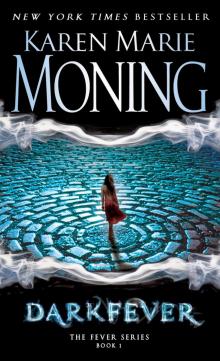 Darkfever
Darkfever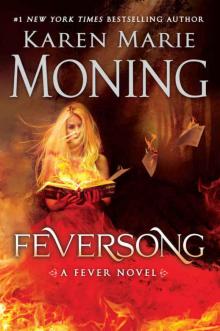 Feversong
Feversong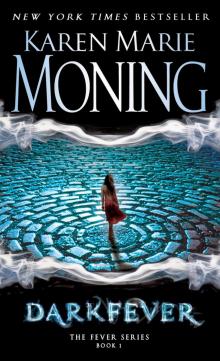 Faefever
Faefever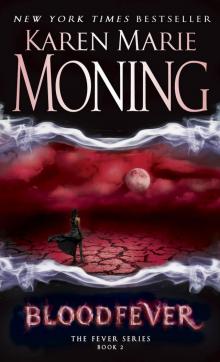 Bloodfever
Bloodfever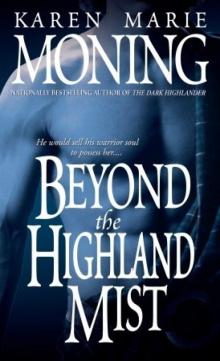 Beyond the Highland Mist
Beyond the Highland Mist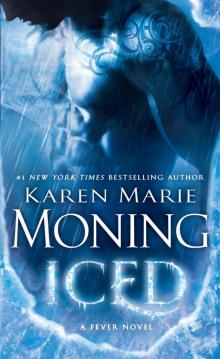 Iced
Iced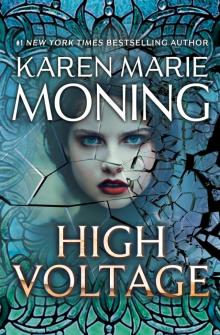 High Voltage
High Voltage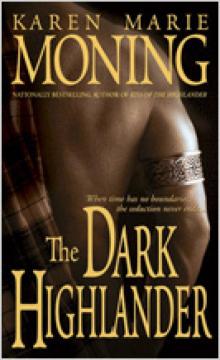 The Dark Highlander
The Dark Highlander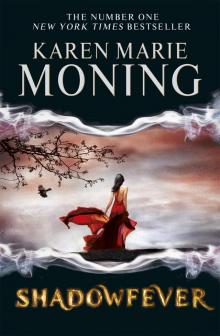 Shadowfever
Shadowfever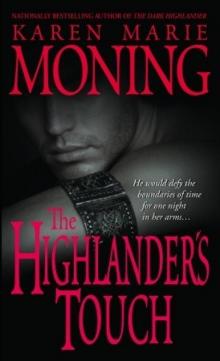 The Highlander's Touch
The Highlander's Touch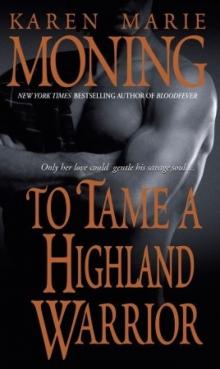 To Tame a Highland Warrior
To Tame a Highland Warrior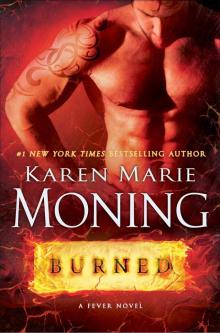 Burned
Burned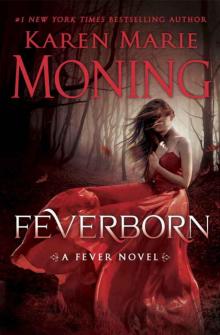 Feverborn
Feverborn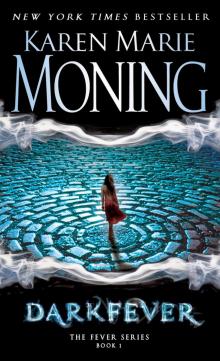 Dreamfever
Dreamfever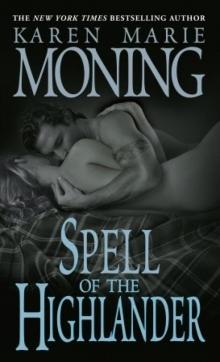 Spell of the Highlander
Spell of the Highlander Kiss of the Highlander
Kiss of the Highlander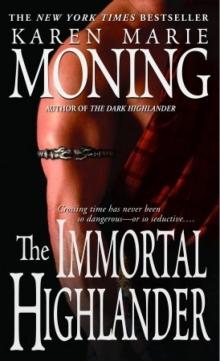 The Immortal Highlander
The Immortal Highlander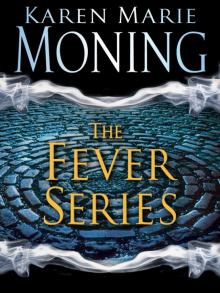 Karen Marie Moning’s Fever Series 5-Book Bundle: Darkfever, Bloodfever, Faefever, Dreamfever, Shadowfever
Karen Marie Moning’s Fever Series 5-Book Bundle: Darkfever, Bloodfever, Faefever, Dreamfever, Shadowfever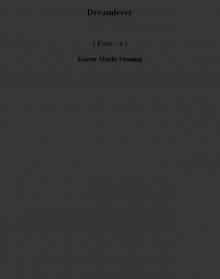 Dreamfever f-4
Dreamfever f-4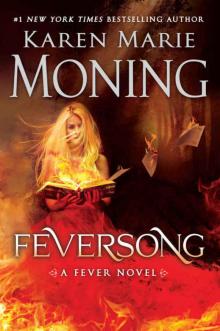 Feversong: A Fever Novel
Feversong: A Fever Novel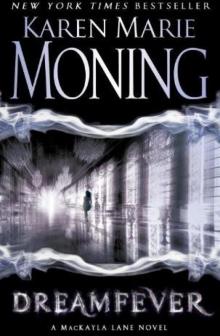 Dreamfever_The Fever Series
Dreamfever_The Fever Series The Highlander Series 7-Book Bundle
The Highlander Series 7-Book Bundle![[Highlander 04] - Kiss of the Highlander Read online](http://i1.bookreadfree.com/i1/03/29/highlander_04_-_kiss_of_the_highlander_preview.jpg) [Highlander 04] - Kiss of the Highlander
[Highlander 04] - Kiss of the Highlander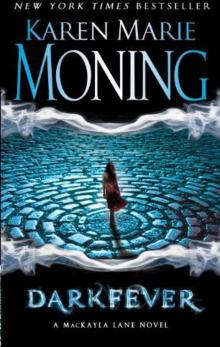 Darkfever_The Fever Series
Darkfever_The Fever Series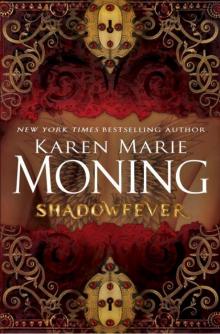 Shadowfever_Fever
Shadowfever_Fever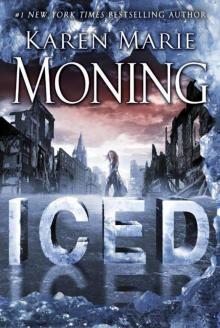 Iced: A Dani O'Malley Novel (Fever Series)
Iced: A Dani O'Malley Novel (Fever Series)![Fever [08] Feverborn Read online](http://i1.bookreadfree.com/i2/04/09/fever_08_feverborn_preview.jpg) Fever [08] Feverborn
Fever [08] Feverborn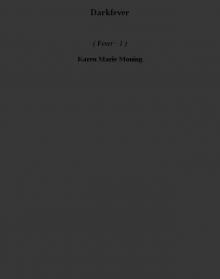 Darkfever f-1
Darkfever f-1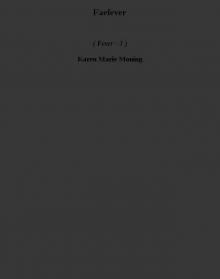 Faefever f-3
Faefever f-3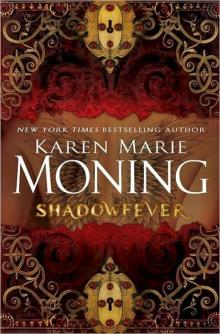 Shadowfever f-5
Shadowfever f-5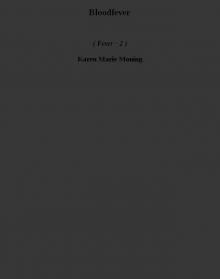 Bloodfever f-2
Bloodfever f-2